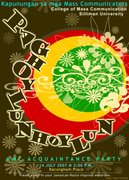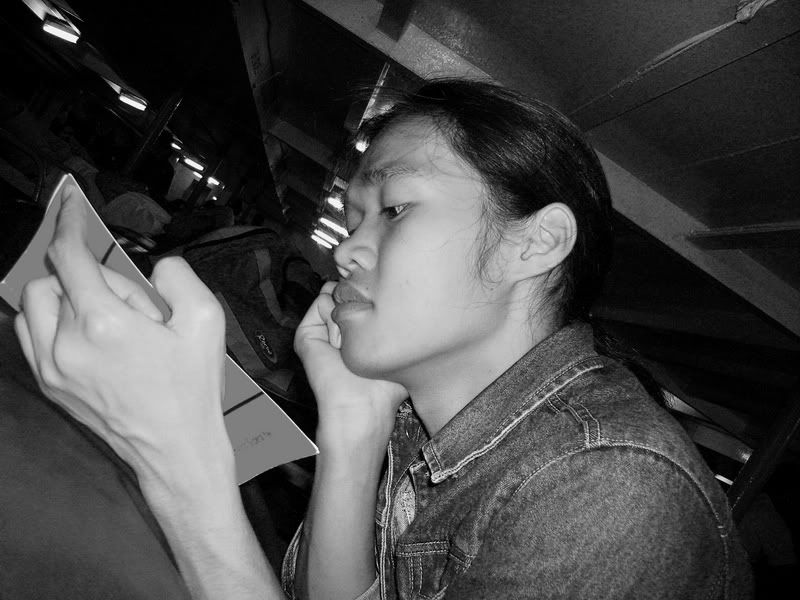Sunday, May 20, 2007
Friday, May 18, 2007
Why we sould love or at least care for our sawsawan?
We should love or at least care for our sawsawan for one simple reason: it adds or enhances the taste of what could be a very simple dish. It could be the tomato sauce we mix with the noodles to make a delightful pasta or the vinegar to which we dip our favorite bulad. Without it, our meal would not be compete.
We have different preferences for our sawsawan. And we could have our own reasons why we choose to stick to it. It could lead us to crave for more or our meal is satisfying despite its meagerness and simplicity because of the sauce we choose. And I have both reasons.
I won't make this long because I promised not to even care about it, but at least now they know. Forgive me for ranting...
PAHABOL: Here's a site offering a recipe to make the best sauce in the world. Click here.
Enjoy! *wink
We have different preferences for our sawsawan. And we could have our own reasons why we choose to stick to it. It could lead us to crave for more or our meal is satisfying despite its meagerness and simplicity because of the sauce we choose. And I have both reasons.
I won't make this long because I promised not to even care about it, but at least now they know. Forgive me for ranting...
PAHABOL: Here's a site offering a recipe to make the best sauce in the world. Click here.
Enjoy! *wink
Wednesday, May 16, 2007
Heron-Woman
Weeks ago, I was tasked by Sir Ian to introduce Ma'am Marj Evasco in her lecture on Cebuano poetry during the 2007 Literatura Festival. Marjorie Evasco is one of my favorite poets and she knows that I'm here number one fan in Silliman.(Sir Ian told her and my friends can attest to that.) Who would say no to this seasonal offer? As far as I can remember, this is probably my first time to introduce a speaker--and of all the speakers in the world, it was Marjorie Evasco, whose poems I memorize heartily.
At the beginning, I thought it was an easy job. Dili man diay, especially when she told me that we still have to wait for Krip Yuson, Gemino Abad and Butch Dalisay because they will also be attending the lecture. Oh my, I don't know if I should be glad or not. I'm finally meeting them, but this also means that they will be listening to my introduction. Then, the trembling began. After Ma'am Padernal's opening remarks, it was mt turn at the podium. From my vantage point, it was both scary and delightful seeing Krip Yuson, Gemino Abad, Butch Dalisay and Ma'am Marj herself listening to me. Haha!
Here's an excerpt of my introduction:
In 1999, she came out with her second collection Ochre Tones: Poems in english and Cebuano, which was launched at the residence of Dr. Edith Lopez Tiempo in Montemar. It took her 12 years to complete this books and calls it "the book of changes anchored upon the primary elements of earth, water, fire and air." It is in this book where she started to reclaim her mother tongue through giving the Cebuano-Visayan translation of her English poems. For her, the shift to becoming a bilingual writer-Cebuano and English-is a political and artistic choice in the context of postcolonial acts of language.

To Ma'am Marj: Thanks for the Heron poetics...
At the beginning, I thought it was an easy job. Dili man diay, especially when she told me that we still have to wait for Krip Yuson, Gemino Abad and Butch Dalisay because they will also be attending the lecture. Oh my, I don't know if I should be glad or not. I'm finally meeting them, but this also means that they will be listening to my introduction. Then, the trembling began. After Ma'am Padernal's opening remarks, it was mt turn at the podium. From my vantage point, it was both scary and delightful seeing Krip Yuson, Gemino Abad, Butch Dalisay and Ma'am Marj herself listening to me. Haha!
Here's an excerpt of my introduction:
In 1999, she came out with her second collection Ochre Tones: Poems in english and Cebuano, which was launched at the residence of Dr. Edith Lopez Tiempo in Montemar. It took her 12 years to complete this books and calls it "the book of changes anchored upon the primary elements of earth, water, fire and air." It is in this book where she started to reclaim her mother tongue through giving the Cebuano-Visayan translation of her English poems. For her, the shift to becoming a bilingual writer-Cebuano and English-is a political and artistic choice in the context of postcolonial acts of language.

To Ma'am Marj: Thanks for the Heron poetics...
Sunday, May 13, 2007
Realization!
Saturday, May 12, 2007
Add to My Cart
After the camp, I bought three books at the Lee Plaza's book sale, thinking that I can indulge in reading this summer.
These books are:

Minions of the Moon
by Richard Bowes
Excerpt:
"Hi. My name is Kevin. I'm fifty-four and I've been stalked by my own Shadow for as long as I can remember." So says Kevin Grierson at the beginning of Richard Bowes' Minions of the Moon. Kevin's Shadow appears to be the product of a family curse; his alcoholic mother also had a Shadow, and Kevin learned early to fear her appearance. His Irish family referred to the Shadows as "Faileas" -- when they referred to them at all.

Tula Station by DAVID TOSCANA
Translated by PATRICIA J. DUNCAN.
Excerpt:
Juan Capistrán asked to be bathed early in the morning and perfumed with some lotion, perhaps to conceal the rancid odor of his flesh. They did not offer him much to choose from, and he made do with a bottle of toilet water. As he awkwardly poured it on his chest, Sister Guadalupe asked:
"Do you want me to comb your hair?"
"I can do it myself."
She opened the window, and the gentle hum of the street became a roar of cars and trucks, steps of people hurrying by, voices selling newspapers and fried pork rind. Along with the noise came a burning wind that, little by little, broke up the humidity in the room and that asphixiating sensation of being next to a chamber pot.

Homestead
by Rosini Lippi
Set firmly in a small village in the Austrian Alps, these 12 interlinking stories are almost ethnographic in their rich detail of small town life. The stories range from the turn-of-the-century to the present, accurately charting change in the remote region of Andelsbuch, Egg and Grossdorf. The author spent four years among the villages of the Bregenz forest collecting information on the local dialect. Winner of the Pen/Hemingway Award.
PAHABOL!
I was able to salvage three books (soaked in rain water) at the campsite.

The Sailor Who Fell From Grace with the Sea
by Yukio Mishima
Plot
As Ryuji begins to draw close to Fusako, a woman of the shore, he is eventually torn away from the dreams he's pursued his entire life. Fusako's son, Noboru, who shares an especially close bond with his mother through a voyeuristic ritual, hates the idea of losing his mother to a man who has let his hope and freedom die. This anger and fear of loneliness translates into terrible, savage acts performed by Noboru and the gang in which he is a part. The novel makes a powerful statement of what it means to discard the beliefs that drive you, the result of copying another's passions and customs, and the lengths some will go to in order to maintain what they believe to be true.

The Queen of Second Place
by Laura Peyton Roberts
Cassie Howard believes everyone has a talent. Unfortunately, hers is taking second place. No matter how hard she tries, she’s always second best . . . in school, in life, and especially in love. When Cassie discovers new-boy-in-town Kevin Matthews she wants him on sight. But so does conniving Sterling Carter, a ridiculously beautiful preppy princess and Cassie’s enemy since freshman year. Can the Queen of Second Place ever truly win?
Unfortunately, I have not started reading one of these... Forgive me :C
I should find time soon...
These books are:

Minions of the Moon
by Richard Bowes
Excerpt:
"Hi. My name is Kevin. I'm fifty-four and I've been stalked by my own Shadow for as long as I can remember." So says Kevin Grierson at the beginning of Richard Bowes' Minions of the Moon. Kevin's Shadow appears to be the product of a family curse; his alcoholic mother also had a Shadow, and Kevin learned early to fear her appearance. His Irish family referred to the Shadows as "Faileas" -- when they referred to them at all.

Tula Station by DAVID TOSCANA
Translated by PATRICIA J. DUNCAN.
Excerpt:
Juan Capistrán asked to be bathed early in the morning and perfumed with some lotion, perhaps to conceal the rancid odor of his flesh. They did not offer him much to choose from, and he made do with a bottle of toilet water. As he awkwardly poured it on his chest, Sister Guadalupe asked:
"Do you want me to comb your hair?"
"I can do it myself."
She opened the window, and the gentle hum of the street became a roar of cars and trucks, steps of people hurrying by, voices selling newspapers and fried pork rind. Along with the noise came a burning wind that, little by little, broke up the humidity in the room and that asphixiating sensation of being next to a chamber pot.

Homestead
by Rosini Lippi
Set firmly in a small village in the Austrian Alps, these 12 interlinking stories are almost ethnographic in their rich detail of small town life. The stories range from the turn-of-the-century to the present, accurately charting change in the remote region of Andelsbuch, Egg and Grossdorf. The author spent four years among the villages of the Bregenz forest collecting information on the local dialect. Winner of the Pen/Hemingway Award.
PAHABOL!
I was able to salvage three books (soaked in rain water) at the campsite.

The Sailor Who Fell From Grace with the Sea
by Yukio Mishima
Plot
As Ryuji begins to draw close to Fusako, a woman of the shore, he is eventually torn away from the dreams he's pursued his entire life. Fusako's son, Noboru, who shares an especially close bond with his mother through a voyeuristic ritual, hates the idea of losing his mother to a man who has let his hope and freedom die. This anger and fear of loneliness translates into terrible, savage acts performed by Noboru and the gang in which he is a part. The novel makes a powerful statement of what it means to discard the beliefs that drive you, the result of copying another's passions and customs, and the lengths some will go to in order to maintain what they believe to be true.

The Queen of Second Place
by Laura Peyton Roberts
Cassie Howard believes everyone has a talent. Unfortunately, hers is taking second place. No matter how hard she tries, she’s always second best . . . in school, in life, and especially in love. When Cassie discovers new-boy-in-town Kevin Matthews she wants him on sight. But so does conniving Sterling Carter, a ridiculously beautiful preppy princess and Cassie’s enemy since freshman year. Can the Queen of Second Place ever truly win?
Unfortunately, I have not started reading one of these... Forgive me :C
I should find time soon...
Tuesday, May 08, 2007
Literatura Festival

The Silliman University Literatura Festival is a month-long event held every summer to honor Philippine writers. It is also meant as a venue to tap the talents and expertise of resident writers and literature scholars of Silliman University and Dumaguete City, as well as visiting writers and scholars in literature, culture, and the arts who are in Dumaguete around May. (Last year, Dean Francis Alfar spoke on speculative fiction in the Philippines. This summer, writers Timothy Montes, Susan Lara, Marjorie Evasco, and others will speak on varied subjects.) The Literatura Festival mainly serves as the Related Literary Events arm of the National Writers Workshop.(from spy in the sandwich)
Subscribe to:
Comments (Atom)






















